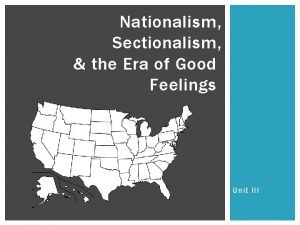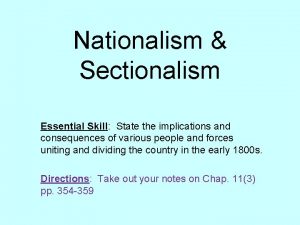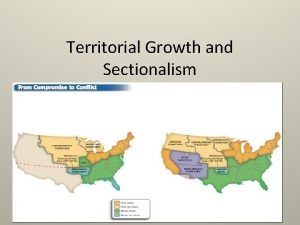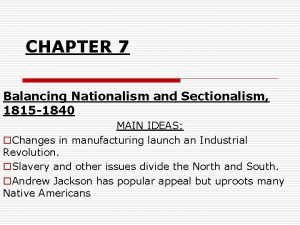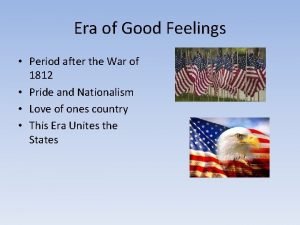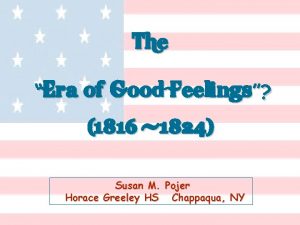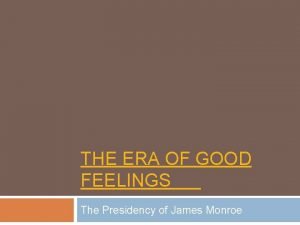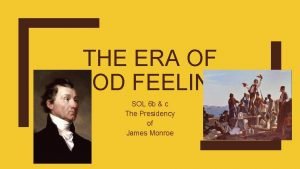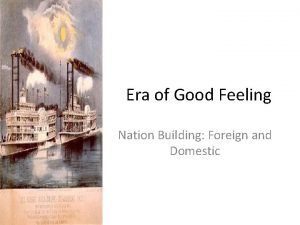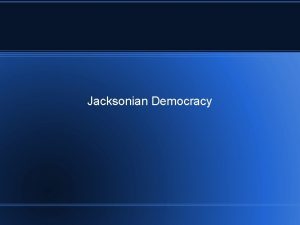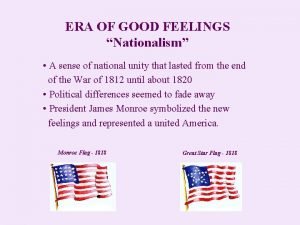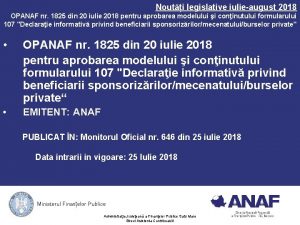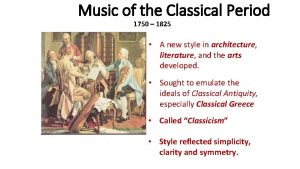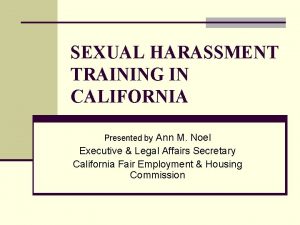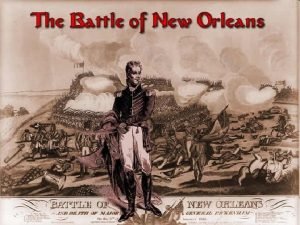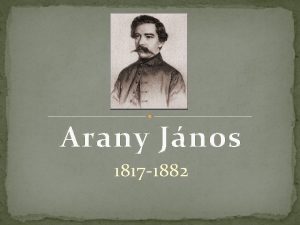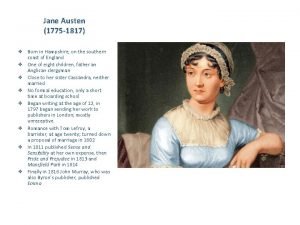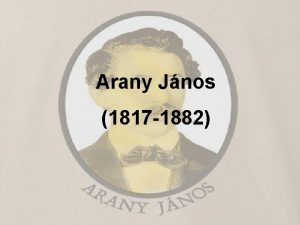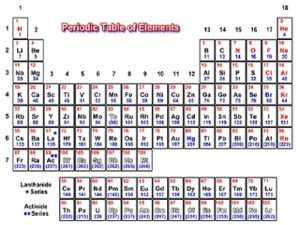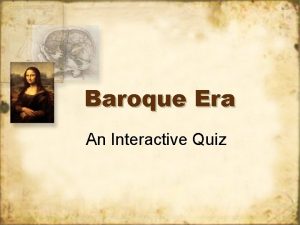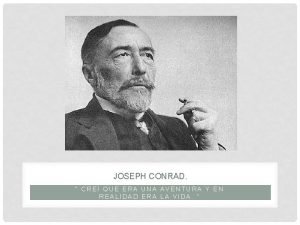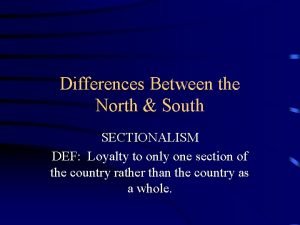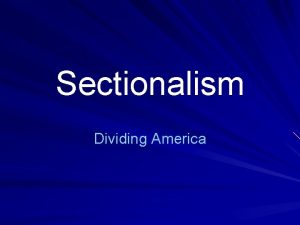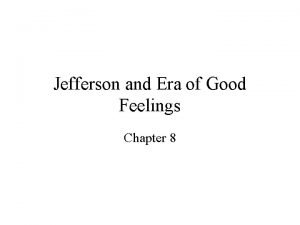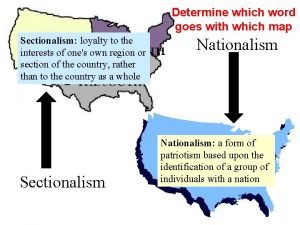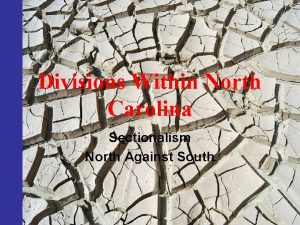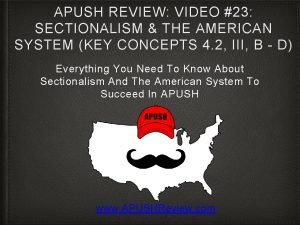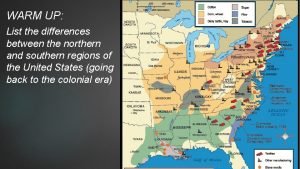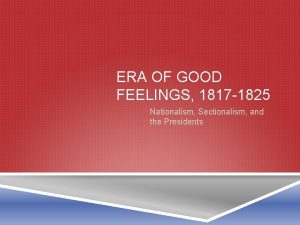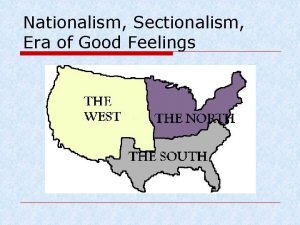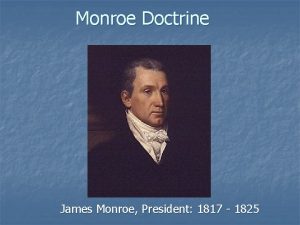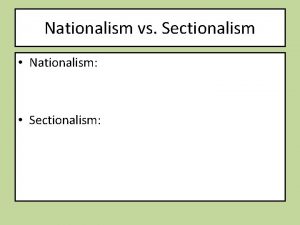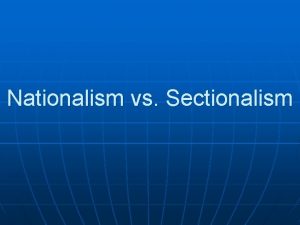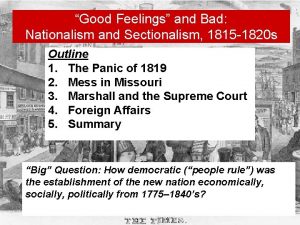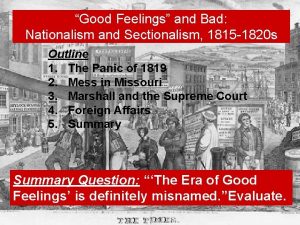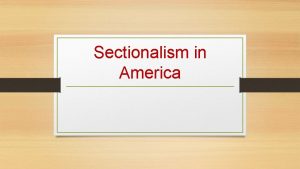ERA OF GOOD FEELINGS 1817 1825 Nationalism Sectionalism

















































- Slides: 49

ERA OF GOOD FEELINGS, 1817 -1825 Nationalism, Sectionalism, and the Presidents

DEFINED ▶ Nationalism(n): loyalty or devotion to a nation, especially an attitude, feeling, or belief characterized by a sense of national consciousness; an exaltation of one nation above all others ▶ Sectionalism (n): restriction of interest to a narrow sphere; undue concern with local interests or petty distinctions at the expense of general well-being.



PRESIDENT # 5 JAMES MONROE ▶ Americans still feeling their Post-War Nationalism ▶ Monroe’s Presidency is defined by this nationalism ▶ Harmony in Politics: ▶ Federalist Party is dead; ONE major political party (DRs) ▶ Effects?

CULTURAL NATIONALISM ▶ New group of voters: YOUNG ▶ Past politicians concerns: Europe ▶ New politicians concerns: Expansion ▶ SURGE OF PATRIOTISM ▶ Paintings of revolutionaries ▶ Noah Webster’s Spelling book

ECONOMIC NATIONALISM ▶ Post War of 1812: Great Britain sends cheap goods into the US; threatens US companies ▶ Does this sound familiar? ☺ ▶ Tariff of 1816 ▶ 1 st Protective Tariff—created to protect US businesses ▶ Usually opposed but passed because of NATIONALISM

ECONOMY: “AMERICAN SYSTEM” PROPOSAL 1. Protective Tariff 2. National Bank 3. Road / Canal Building ACTION 1. Tariff adopted 1816 ▶ Helps manufacturing, set at 2025% 2. Bank of US in 1816 ▶ Provides currency 3. Internal Improvements ▶ Promotes growth ▶ National (Cumberland) Road ▶ Erie Canal (1817/1825)

ECONOMIC NATIONALISM ▶ The Second National Bank ▶ First charter expired 1811; Banks free to print their own money (disaster!) ▶ 1816, Congress est. 2 nd National Bank; many opposed to using money for internal improvements ▶ Transportation Bill: Congress wants to federal fund roads ▶ Vetoed by Monroe and states pick it up


Supreme Court Cases JUDICIAL NATIONALISM

JUDICIAL NATIONALISM DIRECTIONS: 1. Break into pairs 2. Create the following chart, then answer the questions using these site: https: //www. oyez. org/cases/1789 -1850/17 us 316 - Mc. Coulloch v. Maryland 3. https: //www. oyez. org/cases/1789 -1850/22 us 1 - Gibbons v. Ogden Mc. Culloch v. Maryland WHO? CONSTITUTIONAL QUESTION DECISION IMPACT on GOVT Gibbons v. Ogden

M v. M G v. O Who? James W. Mc. Culloch of the National Ogden: Permission to run Bank Branch of MD steamboat in NY waters granted by Chief Justice: state of NY John State of MD Marshall Gibbons: Permission to run steamboat in NY waters from Federal Gov’t Constitutiona l Question 1. 2. Does Congress have the power to charter a national bank? (again) Could a state place a tax on a federally chartered bank? Is it constitutional for both states and the federal government to regulate interstate commerce? Decision Supreme Court ruled that a federal institution is supreme to state and states have no control over federal institutions Supreme Court ruled that only the federal government has control over interstate commerce Impact on Government STRENGTHENS S. C. /National Government

REVIEW ▶ List and explain 2 examples of events that strengthened nationalism in the United States during the Era of Good Feelings

DIPLOMATIC NATIONALISM Rush-Bagot Treaty 2. Adam-Onis Treaty 3. Monroe Doctrine 1. DECISION MAKERS ▶ President: Monroe ▶ Sect. of State: JQA ▶ Advisor: Jefferson

RUSH-BAGOT TREATY ▶ Treaty of Ghent: unresolved issues in Canada ▶ 1817: 1 st year of presidency ▶ Disarmament Pact signed called the Rush-Bagot Treaty ▶ Limited naval arming on Great Lakes ▶ Longest unfortified boundary in the world

JACKSON INVADES FLORIDA ▶ 1818: Spain still has control of Florida ▶ US runaway slaves escape to Spanish Florida ▶ Native Americans retreat to Spanish Florida ▶ Creek Indians travel to Florida to regroup and plan a new strategy for attack on Georgia ▶ call themselves “Seminoles” meaning runaways ▶ John C Calhoun, now Secretary of War to Monroe, authorizes military action against the Seminoles


ADAMS-ONIS TREATY ▶ Jackson goes to Florida for the Seminoles ▶ Destroys a few cities and removing the Governor (oops) ▶ Spain is angry, Monroe is angry ▶ Secretary of State JQA defends Jackson, claiming Spain wasn’t keeping order in Florida ▶ Adams-Onis Treaty of 1819: ▶ Spain gives all of Florida to the United States ▶ Est. border between U. S. and “New Spain” (aka Mexico)


MONROE DOCTRINE ▶ Spain’s colonies being to revolt ▶ 1824: Spain only has 3 island colonies left ▶ Restoration of monarchies post-Napoleon ▶ European nations of Great Britain, Austria, Prussia, and Russia form the “Quadruple Alliance” ▶ Suppress democracy in Europe ▶ Also wants to help Spain get back lost colonies ▶ Should America be worried? READ M. D.

MONROE DOCTRINE, EXPLAINED ▶ 1. Western Hemisphere was closed to further European exploration ▶ 2. US would not interfere with existing colonies under European power ▶ 3. The US would not interfere with internal affairs of any European power ▶ 4. Any attempt by Europe to intervene would be regarded as an act of aggression


SIGNIFICANCE? ▶ How does the Monroe Doctrine impact American and European involvement in worldly affairs? ▶ 1. Proved nationalism in US yet again ▶ 2. America is officially becoming a world power ▶ 3. Isolation policy in effect ▶ 4. US can exert its influence without European interference…

Nationalism to Sectionalism A CHANGING NATION

POPULATION BOOM ▶ 1800 -1825: Population Doubles. Why? ▶ High birth rate ▶ Immigrants from GB and Germany (1830 s) ▶ African American and Native American population growth ▶ Rapid urban and western expansion

REASONS TO GO WEST? New Land: provided after Native Americans were driven from lands 2. Economy: embargo and war in North East, new soil needed in South 3. Transportation: new roads to reach frontier 4. Immigrants: Europeans coming over; cheaper lands in the West 1. FUTURE PROBLEMS?

NEW QUESTIONS/ISSUES ▶ Focus on the West… ▶ West=small populations ▶ Western politicians: where do their loyalties lie? ▶ Western States Support: 1. Easy Credit from state banks 2. Land made available at a low price 3. Improved transportation 4. WHAT ABOUT SLAVERY?

REGIONAL SECTIONALISM North ➢ Industrial Northeast (New England) ➢ Organized labor ➢ Free African Americans ➢ New Cities ➢ Immigration South ➢ Agriculture and King Cotton ➢ The “Peculiar Institution” ➢ Free African Americans vs. White Society ➢ Southern Thought West ➢ Native Americans ➢ The Frontier ➢ Women’s roles ➢ Environmental damage

SECTIONALISM ▶ As Americans start to expand, there is a fragile balance of power between slave states and free states. ▶ When new states enter the union, we want to maintain the balance… ▶ Missouri Compromise


MISSOURI COMPROMISE BREAK DOWN ▶ Applied to enter the union as a SLAVE state ▶ Pre-Missouri: Slave States=11, Free States=11 ▶ Addition of a Slave State would give South control of Senate (North already had the house because of population) ▶ Slavery Issue: “like a firebell in the night”-TJ ▶ As president…what do you do?

THE COMPROMISE ▶ Henry Clay ▶ Maine is separated from Mass. to become a Free State ▶ Missouri enters as a Slave State ▶ All territory NORTH of 36, 30’ parallel is closed to slavery

LIKE A FIREBELL IN THE NIGHT ▶ Passed in 1820 ▶ Prohibits slavery NORTH of the parallel 36, 30’ north, except in the new state of Missouri ▶ This will not be permanent, “just a band aid on a gunshot wound”




JOHN QUINCY ADAMS End of the Era of Good Feelings

ELECTION OF 1824 ▶ Monroe leaves presidency after 2 terms Bye Monroe! ▶ Warns about international interference (surprised? ) ▶ Who usually gets presidency? : Sect. of State ▶ John Q. Adams v. 4 other Candidates Hello JQA?

ADAMS AND JACKSON: RESUMES John Adams: 1. Sect of State 2. Former minister to Russia 3. Drafted Treaty of Ghent 4. Outlined Monroe Doctrine 5. Adams-Onis Treaty 6. Backed merchant interests of New England 7. Son of former President 8. “Principle, not Popular” Andrew Jackson 1. General and War Hero of 1812 2. Battle of New Orleans 3. U. S. Representative and Senator 4. Complete opposite of Adams 5. “Down to earth” common 6. Accused of gambling, murder, dueling, adultery, and military tyranny


ELECTION OF 1824 ▶ What parties? ONLY ONE! (why? ) ▶ 5 Republican Candidates… ▶ Electoral College: Jackson, 99 votes; Adams, 84 ▶ No majority winner so it falls to the House… ▶ Clay=Speaker of the House, HATES Jackson ▶ Clay-Adams Alliance: Clay (KY) allies with Adams (NE) to secure his winning of the Presidency in return for becoming Sect. of State…CORRUPT BARGAINING ▶ Potential effects? 2 Party System back in action ▶ National Republicans (Whigs)-Adams/Clay ▶ Democrats-Jackson

JQA’S PRESIDENCY: A MAN OF PRINCIPLE ▶ One term president (following daddy’s footsteps) ▶ Immediately torn down by Jackson ▶ Favored strong federal economic policies like American System ▶ Desired publically funded universities for research ▶ Elitist

JQA ▶ Very few ideas passed by JQA’s wife Louisa was born outside of the US; dissenters used this to accuse him of being pro. British Congress ▶ Questioned dangers of democracy (GASP) ▶ Refused to campaign-not a popularity contest, comes off as elitist ▶ Overturned Creek Indian Treaty of 1825 -returned lands to Indians (Gasp again)

POLITICAL CARTOON 1. Your cartoon must be on typing paper and in INK and COLORED 2. Your work will be assessed on the quality of your analysis as well as your artistic effort 3. Be prepared to share your work

POTENTIAL TOPICS! ▶ Hartford Convention ▶ Mc. Culloch v. Maryland ▶ Death of Federalist Party ▶ Gibbons v. Ogden ▶ Era of Good Feelings ▶ Missouri Compromise ▶ The American System (or ▶ Election of 1824 Key Components) ▶ Adams-Onis Treaty ▶ Monroe Doctrine ▶ Corrupt Bargaining ▶ Panic of 1819 ▶ Legacy of John Marshal



 Similarities between nationalism and sectionalism
Similarities between nationalism and sectionalism Feelings feelings feelings
Feelings feelings feelings Quiz 3: nationalism and sectionalism
Quiz 3: nationalism and sectionalism Patriotism vs nationalism venn diagram
Patriotism vs nationalism venn diagram Nationalism vs sectionalism
Nationalism vs sectionalism Chapter 7 balancing nationalism and sectionalism
Chapter 7 balancing nationalism and sectionalism What's the difference between nationalism and sectionalism
What's the difference between nationalism and sectionalism Era of good feelings cartoon
Era of good feelings cartoon Era of good feelings facts
Era of good feelings facts Era of good feelings political cartoon
Era of good feelings political cartoon Era of good feelings timeline
Era of good feelings timeline Era of good feelings facts
Era of good feelings facts Whats the era of good feelings
Whats the era of good feelings What does era of good feelings mean
What does era of good feelings mean Era of good feelings
Era of good feelings Opanaf 1825 din 2018
Opanaf 1825 din 2018 1750-1825
1750-1825 Music of the classical period (1750 to 1820)
Music of the classical period (1750 to 1820) Thaumatrope中文
Thaumatrope中文 Ab 1825 supervisor definition
Ab 1825 supervisor definition 1750-1825
1750-1825 17 novembre 1825 a neuchâtel
17 novembre 1825 a neuchâtel Catecismo 1818
Catecismo 1818 Epidemiology concept
Epidemiology concept Reg és arany jános
Reg és arany jános A virtue is an habitual and firm disposition to do the good
A virtue is an habitual and firm disposition to do the good In 1840 we took a little trip
In 1840 we took a little trip Arany jános gyermekkora
Arany jános gyermekkora Periodic table 1817
Periodic table 1817 1817 hampshire drive
1817 hampshire drive 1817-1882
1817-1882 Patria nueva 1817 a 1823
Patria nueva 1817 a 1823 Periodic table 1817
Periodic table 1817 Good evening students
Good evening students Tom hello good morning hello good
Tom hello good morning hello good Cómo se dice buenas tardes
Cómo se dice buenas tardes You are good you are good when there's nothing good in me
You are good you are good when there's nothing good in me Zoroastrian good thoughts
Zoroastrian good thoughts Poema sobre as estrelas
Poema sobre as estrelas Quiz 2 the baroque era
Quiz 2 the baroque era Elizabethan or victorian
Elizabethan or victorian Creí que era una aventura y en realidad era la vida
Creí que era una aventura y en realidad era la vida Sectionalism def
Sectionalism def Sectionalism def
Sectionalism def Sectionalism
Sectionalism Sectionalism map
Sectionalism map Sectionalism def
Sectionalism def American system apush
American system apush Sectionalism map of the united states
Sectionalism map of the united states Sectionalism
Sectionalism
